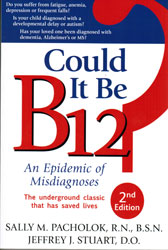All of the water-soluble B vitamins work together to promote healthy nerves, skin, eyes hair, liver, muscle tone and cardiovascular function. They protect us from depression, anxiety and mental disorders. B Vitamins are crucial for optimal health, energy, handling stress, liver detoxification, heart health and mood balance, yet deficiencies are very common. Because B vitamins are water soluble, they are not stored by your body, so they need to be replenished every day.
What is Vitamin B12 and why is it so important?
Vitamin B12 is a fascinating nutrient! It is the only vitamin that you cannot obtain from plants or sunlight. Vitamin B12's metabolism by the body depends on a finely tuned series of events. Our body's metabolic process for this vitamin is far more complex than for other vitamins. In their book, Could It Be B12?, Sally Pacholok, R.N., B.S.N. and Jeffrey Stuart, D.O., describe the pathway required for your body to absorb Vitamin B12:
- The vitamin B12 in your food is bound to animal proteins, and first must be freed. To split the B12 and the protein apart, your body uses and enzyme called pepsin, which can be produced in sufficient amounts only if there is enough hydrochloric acid available to your stomach.
- Your stomach also produces intrinsic factor (IF), a protein that makes its way to your intestine to be available for a later step in the B12 pathway.
- Next, other proteins called R-binders ferry the B12 into your small intestine.
- In the intestine, intrinsic factor, latches onto the B12 (with the help of enzymes called pancreatic proteases) and carries it to the last section of the small intestine, the ileum. The cells that line the ileum contain receptors that grab onto the B12- IF complex, pulling it into the bloodstream.
- In the bloodstream, another protein, transcobalamin II, carries vitamin B12 to the various cells of the body, and then transports the excess to the liver for storage.
How Common is Vitamin B12 Deficiency?
B12 deficiency is a public health crisis which affects millions. The symptoms of B 12 deficiency can resemble symptoms of Alzheimer's Disease, depression, dementia, multiple sclerosis, autism, developmental delay, infertility, fatigue as well as mental illness, so it is oftentimes misdiagnosed. We encourage you to learn about this epidemic of misdiagnoses, so that you can advocate for yourself and your family.
The definitive resource on B12 deficiency, diagnosis and treatment!
This book received a Thumbs up review in the Spring, 2011 issue of Wise Traditions!
Read the complete review by Katherine Czapp on pages 56-58 of the journal
Sally Pacholok, R.N., B.S.N and Jeffrey Stuart, D.O. will be speaking at Wise Traditions 2011 to help raise awareness of the dangers of vitamin B12 deficiency and how the medical community is failing to diagnose this common disorder. Their lecture will educate participants why vitamin B12 is critical for normal growth and development in children and normal health in adults. Learn how to recognize, diagnose and treat B12 deficiency as well understand subclinical B12 deficiency. See which groups are at greatest risk for misdiagnosis and review the cost-effectiveness of early diagnosis and proper treatment. Education, advocacy, and a standard of care change are critical to combat this epidemic!

